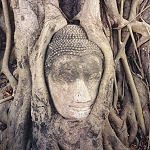Siamese kingship

Siamese kingship
Siam rulers were absolute monarchs whose office was partly religious in nature. They derived their authority from the ideal qualities they were believed to possess. The king was the moral to the Inscription No-1 found in Sukhothai, Ramkhamhaeng was said to hear the petition of any subject who rang the bell at the palace gate to summon him, the king was revered as a father by his people. But the paternal aspects of kingship disappeared at Ayutthaya. The king was considered chakkraphat, the Sanskrit-Pali term for the Chakravartin who through his adherence to the law made all the world revolve around him.[9]
The kings also, according to his official names, were considered as the incarnation of various Hindu gods; Indra, Shiva or Vishnu (Rama). The coronation ceremony was directed by Brahmins.As the Hindu god Shiva was "lord of the universe". However, according to the codes, the king had the ultimate duty as protector of the people and the annihilator of evil. However due to Buddhism's influence in place of Hinduism, the kings were also believed to be a 'Bodhisattava' or 'Buddha'-like. He followed and respected the Dharma Law of Buddha, and sometimes was called 'Dhammaraja'. One of the most important duties of the kings is to build temple or Buddha statute, as a symbol of prosperity and peace.[9]
The Siam king also became by analogy "lord of the land," (Pra Chao Phaendin) distinguished in his appearance and bearing from his subjects. According to the elaborate court etiquette, even a special language, Rachasap (Sanskrit: rājāśabda), was used to communicate with or about royalty. In Ayutthaya, the King was said to grant land to his subjects, from nobles to commoners, even monks and beggars, according to the rule of Sakna or Sakdina. However there has yet been any concrete evidence of Ayutthaya's land management system. Sakna or Sakdina system is unlikely the same as 'feudalism' in Europe.[10]
The French Abbe de Choisy, who came to Ayutthaya in 1685, wrote that, "the king has absolute power. He is truly the god of the Siamese: no-one dares to utter his name." Another 17th century writer, the Dutchman Van Vliet, remarked that the King of Siam was "honoured and worshipped by his subjects second to god." Law and orders were issued by the King. For sometimes the King himself was also the highest judge who judged and punished important criminals such as ones who were traitors or rebels.[11]
One of the numerous institutional innovations of King Trailokanat (1448-88) was to adopt the position of uparaja, translated as "viceroy" or "underking", usually held by the king's senior son or full brother, in an attempt to regularize the succession to the throne—a particularly difficult feat for a polygamous dynasty. In practice, there was inherent conflict between king and uparaja and frequent disputed successions.[

0 ความคิดเห็น:
แสดงความคิดเห็น
สมัครสมาชิก ส่งความคิดเห็น [Atom]
<< หน้าแรก